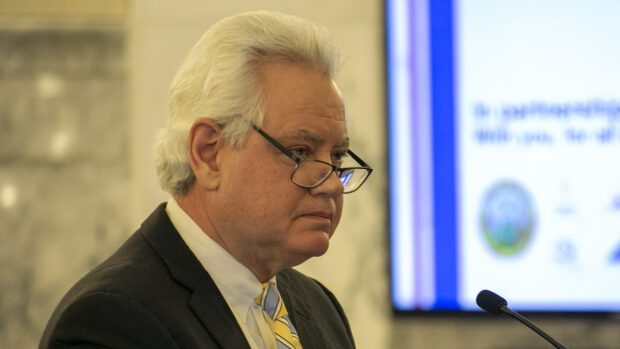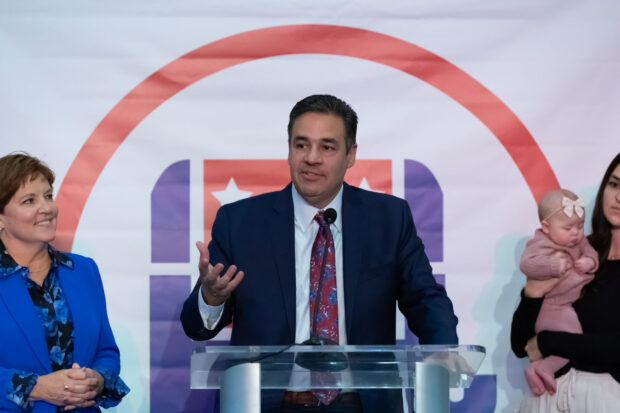(UPDATED, 11:06 a.m., with comment from the University of Idaho. Also updated with details on an Idaho EdNews public records request, and responses from the U of I and the State Board of Education.)
Maybe the University of Idaho really did outmaneuver several other would-be University of Phoenix bidders.
It’s a useful narrative for U of I leaders, who are trying to sell a controversial $685 million deal in a skeptical court of public opinion. It serves the U of I’s backers on the State Board of Education, who might have to defend themselves in a Boise courtroom. And it’s a convenient fallback for Phoenix itself — just in case the U of I deal goes south, and the for-profit online giant winds up back on the selling block.
It all makes it sound like the U of I shrewdly and quickly jumped on a hot lead that will provide new opportunities for rural students and nontraditional learners — and provide the state’s land-grant institution with an outside revenue stream from an embattled (but still viable) education partner.
Good narrative, but does it check out?
Some recent emails suggest the U of I faced competition from several sources. But the U of I and the State Board provided no details to Idaho Education News — even after public records requests. The U of I failed to release, or even acknowledge, an external email that directly addressed the competition over Phoenix.
Here’s what we know, and what we don’t know, in a timeline from the beginning of the saga.
May 17. When the U of I abruptly announced its blockbuster Phoenix megadeal, Idahoans quickly learned the U of I wasn’t Phoenix’s first choice.
Phoenix spent the better part of two years trying to cultivate a deal with the University of Arkansas. On April 24, a divided board of trustees voted down the purchase — which appeared to take Arkansas out of the running. But U of I was quick to convey a sense of urgency, saying officials recognized “the need to move quickly to take advantage of this unique opportunity.”
May 18. The next day, the State Board held its first public meeting to discuss the U of I-Phoenix purchase, giving it unanimous approval. And in the process, the State Board shed some light on three of its closed-door executive sessions: on March 22, April 25 and May 15. The topic: the Phoenix purchase. The justification for the secrecy: a section of state law allowing closed meetings to discuss a transaction that pits Idaho against “governing bodies in other states or nations.”
June 16. During a rare oversight hearing, members of the Legislature’s Joint Finance-Appropriations Committee asked pointed questions to drill down on the competition question.
They received vague answers.

U of I President C. Scott Green said he’d heard “rumors” of two other bidders. State Board Executive Director Matt Freeman said two other bidders were vying for Phoenix, but offered no details.
Idaho Education News submitted public records requests to try to pin down details, but to no avail. The U of I said its senior officials had no “emails, texts or written communications” identifying other prospective bidders. State Board members and staff said the same thing.
June 20. Attorney General Raúl Labrador joined the fray, suing the State Board over its closed executive sessions. Among other things, Labrador argued that the State Board’s justification for secrecy didn’t hold up — especially after Arkansas dropped out of the Phoenix sweepstakes.
Evidently, the June 16 JFAC hearing left Labrador unconvinced. “The State Board of Education unquestioningly relied on the seller’s representation that other state universities were considering purchasing Phoenix,” he wrote in his lawsuit.
June 27. The U of I said emails about Phoenix suitors didn’t exist. But at least one did — and it came from Chris Lynne, the president of the University of Phoenix. (Gov. Brad Little’s office provided this email, and other documents, to reporters this week.)
Our records requests
Idaho EdNews asked the University of Idaho and State Board of Education to provide “any emails, texts or written communications” that identify other prospective University of Phoenix bidders and discuss their bids.
The U of I and the State Board said it had no such records.
Idaho EdNews submitted these public records requests on July 5 — eight days after University of Phoenix President Chris Lynne’s email to U of I President C. Scott Green. The U of I’s response came on July 19, more than three weeks after Lynne’s email.
State Board Executive Director Matt Freeman received a copy of a copy of Lynne’s email to Green, but did not release it in response to the EdNews request. Acting on the advice of attorneys, Freeman decided the email did not fall under the records request, “because it did not identify by name ‘prospective bidders,'” State Board spokesman Mike Keckler said Thursday.
U of I spokeswoman Jodi Walker offered a similar explanation Thursday morning. “The parameters of the public records request did not encompass the letter from Chris Lynne to C. Scott Green. While the letter talks of other offers that occurred from interested parties, it did not identify bids or bidders, nor did it contain any discussion of particular bids.”
Gov. Brad Little’s office provided the email to reporters this week.
Lynne’s email didn’t refer to other bidders by name, only as Party A and Party B. But in a clear reference to Arkansas, Lynne said Party A’s interest in Phoenix “significantly diminished” after the trustees’ vote. “By the time of the final discussions and negotiations in May 2023, the sole competition to UI proposal was from the offer from Party B, a non-state, non-governmental buyer.”
Lynne’s email cast doubt on the June 16 claims — made both by Green and Freeman — that the U of I faced competition from two bidders.

The “non-state, non-governmental” suitor throws another wrinkle into Labrador’s lawsuit over closed meetings. Again, the open meetings law — and the exemption used by the State Board — addresses only competition with other “governing bodies.”
July 18. Green received a second email: from Gregory Finkelstein of Tyton Partners, a New York financial adviser hired by Phoenix to work on a sale. His email, also provided through Little’s office, suggests Phoenix had a number of would-be buyers, in addition to the U of I and the unnamed, non-public Party B.
Despite the trustees’ vote, a University of Arkansas official said the institution “still wanted to pursue a potential acquisition,” Finkelstein wrote. And he mentioned another competitor: Party C, a “highly reputable state university system.” Phoenix focused on the U of I and Party B, because they were farther along in the process. Arkansas and Party C were, essentially, fallback options.
“UI was aware of our ongoing discussions with other potential buyers, including state universities and private entities, and understood that those parties remained viable alternatives,” Finkelstein wrote.
Written as a followup to Lynne’s email — and a look at the “competitive dynamics” of the bidding process — the Finkelstein email seemed designed to rebuild the narrative that the U of I beat out several competitors for Phoenix.
July 18. On this same day, Boise attorney Trudy Hanson Fouser entered the picture. Hired to defend the State Board against Labrador’s lawsuit, Fouser filed a motion to dismiss the case.
Fouser accused Labrador of jumping to the conclusion that the Arkansas trustees’ vote eliminated the competition for Phoenix. And she offered an intriguing defense, based on an Oregon case: expecting the State Board to have actual knowledge of other bidders would create “an impossible standard which could easily lead to the loss of opportunities for the state.”
Fouser suggested the State Board had to act, at some level, on faith. “It reasonably relied upon the representations that it was in competition with the governing bodies of other states or nations.”
July 21. Fouser sent a letter to Labrador, ramping up her criticism. Citing the Lynne and Finkelstein emails as evidence, she said there is “no question” U of I was engaged in a competitive process, rendering Labrador’s lawsuit “meritless.” Labrador has not commented on the motion to dismiss.
July 27. In a written statement to EdNews, spokeswoman Jodi Walker offered a little more detail about what the U of I knew — and when.
The U of I became aware that the University of Arkansas was a bidder only after the news was leaked. But Walker said the U of I didn’t know much more, since non-disclosure agreements covered all of Phoenix’s conversations with would-be buyers.
“We were made aware of the seller’s desire to find a public higher education system to acquire the University of Phoenix, and this has been verified by the sellers in correspondence to the U of I,” she wrote. “However, the specific identities of specific state systems has not been revealed by the sellers, as was their practice throughout the discussions with U of I.”
The competition question is at the heart of the Labrador lawsuit — and, by extension, a political confrontation pitting the once and possibly future gubernatorial candidate against incumbent Gov. Brad Little.
But there’s more to this.
Skeptics — and there are plenty of them — don’t understand why the U of I wants to set up a nonprofit to finance the Phoenix purchase, putting the university’s reputation and finances on the line. They suggest the U of I is overpaying for a toxic asset.
Supporters — including the State Board — say the U of I is making a bold, visionary investment.
The U of I wasn’t the only bidder for Phoenix. The University of Arkansas was (and maybe still is) interested. That piece of the narrative is clear. The rest is more complicated.
Kevin Richert writes a weekly analysis on education policy and education politics. Look for his stories each Thursday.
More reading: When did the U of I start looking at a Phoenix purchase? Sooner than the U of I originally said.
And more about the Labrador lawsuit, from Ryan Suppe of the Idaho Statesman and Laura Guido of the Idaho Press.
